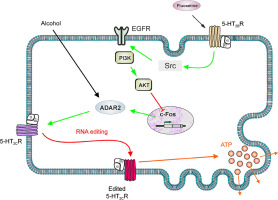当前位置:
X-MOL 学术
›
Neurochem. Int.
›
论文详情
Our official English website, www.x-mol.net, welcomes your feedback! (Note: you will need to create a separate account there.)
Fluoxetine improves behavioural deficits induced by chronic alcohol treatment by alleviating RNA editing of 5-HT2C receptors.
Neurochemistry international ( IF 4.2 ) Pub Date : 2020-01-19 , DOI: 10.1016/j.neuint.2020.104689 Zexiong Li 1 , Yan Lu 2 , Shanshan Liang 1 , Shuai Li 1 , Beina Chen 1 , Manman Zhang 1 , Maosheng Xia 3 , Dawei Guan 4 , Alexei Verkhratsky 5 , Baoman Li 1
Neurochemistry international ( IF 4.2 ) Pub Date : 2020-01-19 , DOI: 10.1016/j.neuint.2020.104689 Zexiong Li 1 , Yan Lu 2 , Shanshan Liang 1 , Shuai Li 1 , Beina Chen 1 , Manman Zhang 1 , Maosheng Xia 3 , Dawei Guan 4 , Alexei Verkhratsky 5 , Baoman Li 1
Affiliation

|
The alcoholism and major depressive disorder are common comorbidity, with alcohol-induced depressive symptoms being eased by selective serotonin re-uptake inhibitors (SSRIs), although the mechanisms underlying pathology and therapy are poorly understood. Chronic alcohol consumption affects the activity of serotonin 2C receptors (5-HT2CR) by regulating adenosine deaminases acting on RNA (ADARs) in neurons. Astrogliopathic changes contribute to alcohol addiction, while decreased release of ATP from astrocytes can trigger depressive-like behaviours in mice. In this study, we discovered that chronic alcohol treatment increased editing of RNA of 5-HT2CR via up-regulating the expression of ADAR2, consequently reducing the release of ATP from astrocytes induced by 5-HT2CR agonist, MK212. Moreover, SSRI antidepressant fluoxetine decreased the expression of ADAR2 through the transactivation of EGFR/PI3K/AKT/cFos signalling pathway. The increased release of astroglial ATP by MK212 which was suppressed by chronic alcohol consumption, and reduction in ADAR2 activity eliminated the RNA editing of 5-HT2CR increased by alcohol in vitro and recovered the release of ATP from astrocytes induced by MK212. Meanwhile, fluoxetine improved the behavioural and motor symptoms induced by alcohol addiction and decreased the alcohol intake. Our study suggests that the astrocytic 5-HT2CR contribute to alcohol addiction; fluoxetine thus can be used to alleviate depression, treat alcohol addiction and improve motor coordination.
中文翻译:

氟西汀通过减轻5-HT2C受体的RNA编辑来改善慢性酒精治疗引起的行为缺陷。
酒精中毒和重度抑郁症是常见的合并症,尽管对病理和治疗的基本机制尚不了解,但通过选择性5-羟色胺再摄取抑制剂(SSRI)可以缓解酒精引起的抑郁症状。长期饮酒可通过调节神经元中作用于RNA(ADAR)的腺苷脱氨酶来影响5-羟色胺2C受体(5-HT2CR)的活性。星形胶质变会导致酒精成瘾,而星形胶质细胞中ATP释放的减少会触发小鼠的抑郁样行为。在这项研究中,我们发现慢性酒精处理通过上调ADAR2的表达来增加5-HT2CR RNA的编辑,从而减少了5-HT2CR激动剂MK212诱导星形胶质细胞释放ATP。此外,SSRI抗抑郁药氟西汀通过EGFR / PI3K / AKT / cFos信号转导通路的反式激活降低了ADAR2的表达。MK212增加星形胶质ATP的释放,这被慢性饮酒所抑制,而ADAR2活性的降低消除了酒精体外增加的5-HT2CR RNA编辑,并恢复了MK212诱导的星形胶质细胞释放ATP。同时,氟西汀改善了酒精成瘾引起的行为和运动症状,并减少了酒精摄入。我们的研究表明,星形细胞5-HT2CR会导致酒精成瘾。因此,氟西汀可用于缓解抑郁症,治疗酒精成瘾和改善运动协调性。MK212增加星形胶质ATP的释放,这被慢性饮酒所抑制,而ADAR2活性的降低消除了酒精体外增加的5-HT2CR RNA编辑,并恢复了MK212诱导的星形胶质细胞释放ATP。同时,氟西汀改善了酒精成瘾引起的行为和运动症状,并减少了酒精摄入。我们的研究表明,星形细胞5-HT2CR会导致酒精成瘾。因此,氟西汀可用于缓解抑郁症,治疗酒精成瘾和改善运动协调性。MK212增加星形胶质ATP的释放,这被慢性饮酒所抑制,而ADAR2活性的降低消除了酒精体外增加的5-HT2CR RNA编辑,并恢复了MK212诱导的星形胶质细胞释放ATP。同时,氟西汀改善了酒精成瘾引起的行为和运动症状,并减少了酒精摄入。我们的研究表明,星形细胞5-HT2CR会导致酒精成瘾。因此,氟西汀可用于缓解抑郁症,治疗酒精成瘾和改善运动协调性。氟西汀改善了酒精成瘾引起的行为和运动症状,并减少了酒精摄入。我们的研究表明,星形细胞5-HT2CR会导致酒精成瘾。因此,氟西汀可用于缓解抑郁症,治疗酒精成瘾和改善运动协调性。氟西汀改善了酒精成瘾引起的行为和运动症状,并减少了酒精摄入。我们的研究表明,星形细胞5-HT2CR会导致酒精成瘾。因此,氟西汀可用于缓解抑郁症,治疗酒精成瘾和改善运动协调性。
更新日期:2020-01-21
中文翻译:

氟西汀通过减轻5-HT2C受体的RNA编辑来改善慢性酒精治疗引起的行为缺陷。
酒精中毒和重度抑郁症是常见的合并症,尽管对病理和治疗的基本机制尚不了解,但通过选择性5-羟色胺再摄取抑制剂(SSRI)可以缓解酒精引起的抑郁症状。长期饮酒可通过调节神经元中作用于RNA(ADAR)的腺苷脱氨酶来影响5-羟色胺2C受体(5-HT2CR)的活性。星形胶质变会导致酒精成瘾,而星形胶质细胞中ATP释放的减少会触发小鼠的抑郁样行为。在这项研究中,我们发现慢性酒精处理通过上调ADAR2的表达来增加5-HT2CR RNA的编辑,从而减少了5-HT2CR激动剂MK212诱导星形胶质细胞释放ATP。此外,SSRI抗抑郁药氟西汀通过EGFR / PI3K / AKT / cFos信号转导通路的反式激活降低了ADAR2的表达。MK212增加星形胶质ATP的释放,这被慢性饮酒所抑制,而ADAR2活性的降低消除了酒精体外增加的5-HT2CR RNA编辑,并恢复了MK212诱导的星形胶质细胞释放ATP。同时,氟西汀改善了酒精成瘾引起的行为和运动症状,并减少了酒精摄入。我们的研究表明,星形细胞5-HT2CR会导致酒精成瘾。因此,氟西汀可用于缓解抑郁症,治疗酒精成瘾和改善运动协调性。MK212增加星形胶质ATP的释放,这被慢性饮酒所抑制,而ADAR2活性的降低消除了酒精体外增加的5-HT2CR RNA编辑,并恢复了MK212诱导的星形胶质细胞释放ATP。同时,氟西汀改善了酒精成瘾引起的行为和运动症状,并减少了酒精摄入。我们的研究表明,星形细胞5-HT2CR会导致酒精成瘾。因此,氟西汀可用于缓解抑郁症,治疗酒精成瘾和改善运动协调性。MK212增加星形胶质ATP的释放,这被慢性饮酒所抑制,而ADAR2活性的降低消除了酒精体外增加的5-HT2CR RNA编辑,并恢复了MK212诱导的星形胶质细胞释放ATP。同时,氟西汀改善了酒精成瘾引起的行为和运动症状,并减少了酒精摄入。我们的研究表明,星形细胞5-HT2CR会导致酒精成瘾。因此,氟西汀可用于缓解抑郁症,治疗酒精成瘾和改善运动协调性。氟西汀改善了酒精成瘾引起的行为和运动症状,并减少了酒精摄入。我们的研究表明,星形细胞5-HT2CR会导致酒精成瘾。因此,氟西汀可用于缓解抑郁症,治疗酒精成瘾和改善运动协调性。氟西汀改善了酒精成瘾引起的行为和运动症状,并减少了酒精摄入。我们的研究表明,星形细胞5-HT2CR会导致酒精成瘾。因此,氟西汀可用于缓解抑郁症,治疗酒精成瘾和改善运动协调性。


























 京公网安备 11010802027423号
京公网安备 11010802027423号